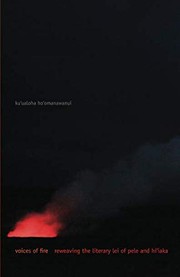Voices of fire
reweaving the literary lei of Pele and Hi'iaka
kuʻualoha hoʻomanawanui.
puke
 Ka Haku: kuʻualoha hoʻomanawanui
Ka Haku: kuʻualoha hoʻomanawanuiKe ʻAno: criticism, interpretation, etc
Nā Kumuhana: Hawaiian literature; Publishers and publishing; Literature and folklore; Hawaiian mythology; Hawaii; Pele (Hawaiian deity); Folklore; History and criticism; History
Ka Hōʻuluʻulu Manaʻo: Stories of the volcano goddess Pele and her youngest sister Hiʻiaka are most familiar as a form of literary colonialism - first translated by missionary descendants and others, then co-opted by Hollywood and the tourist industry. But far from quaint tales for amusement, the Pele and Hiʻiaka literature published between the 1860s and 1930s carried coded political meaning for the Hawaiian people at a time of great upheaval. Voices of Fire recovers the lost and often-suppressed significance of this literature, restoring it to its primary place in Hawaiian culture. kuʻualoha hoʻomanawanui takes up moʻolelo (histories, stories, narratives), mele (poetry, songs), oli (chants), and hula (dances) as they were conveyed by dozens of authors over a tumultuous sixty-eight-year period characterized by population collapse, land alienation, economic exploitation, and military occupation. Her examination shows how the Pele and Hiʻiaka legends acted as a framework for a Native sense of community. The first book-length analysis of Pele and Hiʻiaka literature written by a Native Hawaiian scholar, Voices of Fire compellingly lays the groundwork for a larger conversation of Native American literary nationalism--
- helu_kuhikuhi: 1241
- inoa: Voices of fire
- hope_inoa: reweaving the literary lei of Pele and Hi'iaka
- inoa_wae: Voices of fire
- ʻōlelo_koʻikoʻi: kuʻualoha hoʻomanawanui.
- hulu: puke
- ʻano: criticism, interpretation, etc
- kumuhana: Hawaiian literature|Publishers and publishing|Literature and folklore|Hawaiian mythology|Hawaii|Pele (Hawaiian deity)|Folklore|History and criticism|History
- haku: kuʻualoha hoʻomanawanui
- haku_wae: hoʻomanawanui, kuʻualoha
- hōʻuluʻulu_manaʻo: Stories of the volcano goddess Pele and her youngest sister Hiʻiaka are most familiar as a form of literary colonialism - first translated by missionary descendants and others, then co-opted by Hollywood and the tourist industry. But far from quaint tales for amusement, the Pele and Hiʻiaka literature published between the 1860s and 1930s carried coded political meaning for the Hawaiian people at a time of great upheaval. Voices of Fire recovers the lost and often-suppressed significance of this literature, restoring it to its primary place in Hawaiian culture. kuʻualoha hoʻomanawanui takes up moʻolelo (histories, stories, narratives), mele (poetry, songs), oli (chants), and hula (dances) as they were conveyed by dozens of authors over a tumultuous sixty-eight-year period characterized by population collapse, land alienation, economic exploitation, and military occupation. Her examination shows how the Pele and Hiʻiaka legends acted as a framework for a Native sense of community. The first book-length analysis of Pele and Hiʻiaka literature written by a Native Hawaiian scholar, Voices of Fire compellingly lays the groundwork for a larger conversation of Native American literary nationalism--
- memo: Other applied genres: history
- lā: 2014
- ʻōlelo: ʻŌlelo Haole
- kumu: First peoples, new directions in indigenous studies
Edition Info

Voices of fire
. University of Minnesota Press (Minneapolis), 2014
isbn: 0816679223
isbn: 9780816679225- helu_kuhikuhi: 243
- helu_kuhikuhi_ʻiʻo: 1241
- mea_paʻi: University of Minnesota Press
- wahi_paʻi: Minneapolis
- ana_ʻaoʻao: xxlix, 285 pages
- lā_hpʻ: 2014
- ʻōlelo_hpʻ: ʻŌlelo Haole
- kumu_hpʻ: First peoples, new directions in indigenous studies
- isbn: 0816679223
- isbn_13: 9780816679225
- lccn: 2013028377
- lc_class: PL6448.H66 2014
- dewey: 899/.4209
Holdings
